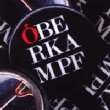|
|

Oberkampf Twenty years after their first 7", released in february 1981, the band Oberkampf come back on the music scene with this reissue of most of their songs. This is an event for two reasons: for one thing the French punk movement has faded away since the beginning of the 80s, for another reason it is the first time that the songs of Oberkampf have been released on CD. The original records were out of print a long time ago. The story of Oberkampf began at the first beginning of eighties', while the wave of punk was fading away. But for Joe Hell (voice), Pat Kebra (guitar), Buck-Dali (bass) and Dominik Descoubes (drums), the purpose was not to become music stars, but to fight against the system. What's more, their motto was "One day punk, always punk". The financial difficulties were however existing, and it was very difficult for Oberkampf to be known in the middle of the new-wave bands. Their saviour was the encounter with Christophe Bourrague, who financed the first 7" named Couleurs Sur Paris. It was one of the first French punk self-productions. This song is a great hymn to youthfulness: "We are governed by crumbling people, bald people, fat people and tall people. Just Imagine your father mug's if these men would have green hairs" ("On est gouverné par des croulants, des chauves, des maigres, des gros et des grands. Imagine un peu la gueule de ton père si ces messieurs avaient les cheveux verts"). Released in only 5,000 copies this first 7" was sold-out in a few weeks. Then The Mankin structure (Virgin) offered Oberkampf a contract, and Couleurs Sur Paris was reissued in a more accessible version to the radios. If the fans were disappointed by this new version, Oberkampf deserved being introduced to the French audiences (more sensitive than the fans!). The year 1982 was a transitional year for the group, surprised by this gratitude. The band recorded one of their best songs Linda, by denoncing the prostitution and the drug throughout the story of a young girl. There was also the great punk version of La Marseillaise (the national hymn), as original as the reggae version composed by Serge Gainsbourg. The first album P.L.C. (for Plein Les Couilles), released in 1983, reassured the fans, with some indictments of the war with the song Fais Attention, of the consumer society with Au Présent, and above all the hopeless letter from a son to his parents in Pardonnez-Moi: "I hate more and more this fucked society, but how explain that there is really no future for me, and that in the night, I often want to die, excuse me" ("Je hais de plus en plus cette putain d'société, mais comment expliquer qu'il n'y a vraiment aucun avenir pour moi et que souvent la nuit j'ai envie d'en finir, pardonnez-moi"), and about wounded childhood within the formidable song Johnny Sois Mauvais... However, their music with these rough words, sometimes out of phase but often realistic, has real difficulties to stand out in the middle of all pop bands. The second album Cris Sans Thèmes, released in 1985, is as dark and excellent as the first. Unfortunately, this album was also the last recorded by Oberkampf: " We achieved Cris Sans Thèmes in one year, and we were conscious of the need of more means to continue, but we have not these" ("On a mis un an à faire Cris Sans Thèmes, c'est là qu'on s'est rendu compte que pour aller plus loin, il nous fallait plus de moyens et on ne les a pas"). They did their last show May 6th 1985. We just thank them for adding on the 2xCD released this year some songs recorded during this show. Besides this compilation album we did not expect any more - Oberkampf are again on tour - just to share their passion with the present youthfulness, far from the revendications of the time, but also just to restore some tremendous moments to the "old" punks! And by way of conclusion: "Only the music has the right to be deadly" ("Seule la musique a le droit d'être meurtrière")... PS: some of details of this text are inspired by the notes on the sleeve written by Christian Eudeline. Copyright © 2001 Patrick Dubail
|
| © 2011 Luna Kafé |